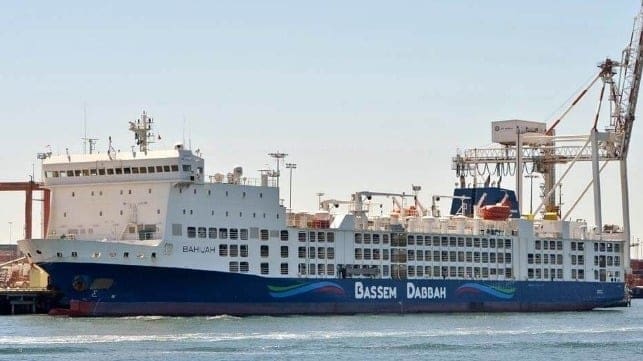
The MV Bahijah in Fremantle in 2018 (Bahnfrend – CC BY-SA 4.0 DEED)
THE live export vessel MV Bahijah that was ordered back to Australia has berthed at Fremantle port, reportedly to take on fodder and potentially offload some sheep and cattle prior to re-export.
The exporter for the Israel-bound vessel had applied to offload some livestock from the MV Bahijah and re-export the remaining animals to the Middle East.
The initially Israel-bound shipment of sheep and cattle was recently ordered back to Australia by the Department of Agriculture Fisheries and Forestry due to tensions in the Red Sea, despite having already diverted to an alternative route via South Africa.
The Department of Agriculture Fisheries and Forestry said it is continuing to assess an application to re-export the livestock provided by the exporter.
WAFarmers Livestock Council president Geoff Pearson said the vessel has berthed to take on fodder and is waiting on department approval to take off some healthy sheep and cattle to make room and meet stocking density requirements for a 33-day journey to the original market.
“There could be up to 500 head come off.”
Mr Pearson said the exporter is waiting on the department to make a decision on unloading the livestock and approving re-export.
He refuted reports that sick livestock were being unloaded and said there are no issues with the intended market taking the livestock.
RSPCA urges department to stop re-export
The berthing came as the RSPCA has urged the department to immediately intervene using its powers under the Export Control Act 2020 to protect the welfare of animals on the vessel and stop their re-export.
The RSPCA said it had urgently written to the department highlighting its grave concerns over the welfare of the sheep and cattle on the vessel. The RSPCA called for an independent veterinarian to be allowed to conduct an emergency check on the welfare of the animals, including a full welfare assessment of the animals.
“This situation could not be more urgent now,” RSPCA Australia chief science officer Dr Suzanne Fowler said.
The department’s last update late yesterday said it continues to work closely with the exporter to determine the next steps for the livestock on board the MV Bahijah and reach a resolution as quickly as possible.
The department met with the Inspector-General of Animal Welfare and Live Animal Exports and other relevant entities to provide an update on the situation yesterday.
DAFF said the latest reports from the veterinarian on board the vessel suggest the livestock remain in good health and there is no evidence of any significant health, welfare or environmental concerns.
Two independent veterinarians visited the vessel yesterday to inspect the livestock and facilities.
Australia’s Chief Veterinary Officer, Dr Beth Cookson, said people can have confidence the department is focused on achieving an optimal outcome for the health and wellbeing of the livestock on board, while at the same time preserving Australia’s pristine biosecurity status.
“There is an intensive effort occurring across a range of expert and regulatory areas within the Australian Government Department of Agriculture, Fisheries and Forestry.
“Those involved in government and industry are very conscious of the need to move quickly while working through these arrangements,” she said.
“The exporter’s registered veterinarian is on board the vessel and is recording details of the health and welfare of the livestock.
“While we have found those reports are encouraging, the department has also engaged veterinarians to travel to the vessel and review conditions on board for additional due diligence.”

HAVE YOUR SAY